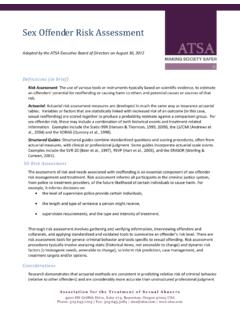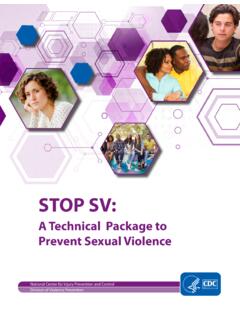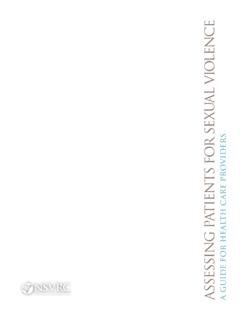Transcription of ATSA
1 Association for the Treatment of sexual Abusers Assessment and Treatment of Adolescents with Intellectual Disabilities Who Exhibit sexual Problems or Offending Behaviors 2015. ATSA.. MAKING SOCIETY SAFER. Sound Research | Informed Policy | Effective Practice Assessment and Treatment of Adolescents with Intellectual Disabilities Who Exhibit sexual Problems or Offending Behaviors Association for the Treatment of sexual Abusers 4900 Griffith Drive, Suite 274. Beaverton, Oregon 97005. Contact: (503) 643-1023. Web: 2015 Association for the Treatment of sexual Abusers The Association for the Treatment of sexual Abusers is an international, multi-disciplinary organization dedicated to preventing sexual abuse. Through research, education, and shared learning ATSA promotes evidence-based practice, public policy, and community strategies that lead to the effective assessment, treatment, and management of individuals who have sexually abused or are at risk to abuse.
2 ATSA is an association of individuals from around the world committed to achieving a high level of professional excellence. ATSA promotes the philosophy that empirically based assessment, practice, management, and policy strategies will: enhance community safety, reduce sexual recidivism, protect victims and vulnerable populations, transform the lives of those caught in the web of sexual violence, and illuminate paths to prevent sexual abuse. Suggested Citation: Blasingame, G. D., Creeden, K. & Rich, P. (2015). Assessment and Treatment of Adolescents with Intellectual Disabilities Who Exhibit sexual Problems or Offending Behaviors. Beaverton, OR: Association for the Treatment of sexual Abusers. Available from Readers will notice that this document is, by its brevity, not all- inclusive, but there are many resources noted in the body of this packet that provide additional information to practitioners.
3 It is beyond the scope of this informational packet to be exhaustive on any one topic, and this certainly may be said of each section herein. It is hoped that each section will pique readers' interest regarding issues relevant to working with intellectually disabled adolescents who exhibit sexual problems or engage in offending behaviors, in addition to providing references and resources that will help enrich their knowledge and practice repertoire. EXECUTIVE SUMMARY. The assessment, treatment, supervision, and case management of adolescents who have sexual problems or offending behaviors (SPOB) are recognized as both complex and different from services provided to adults. This can be particularly challenging when these adolescents also have intellectual disabilities (ID).
4 sexual problems or offending behaviors are defined in this context as sexual behaviors that are offensive and/or harmful to others, that place the adolescent at odds with society's rules, and that may lead to legal sanctions. The prevalence of adolescents with intellectual disabilities who have SPOB varies from study to study, but the general view is that adolescents with intellectual disabilities are overrepresented in the juvenile justice system. As a result, practitioners providing assessment, treatment, and case management services to adolescents who have SPOB are likely to encounter adolescents with ID. Adolescents with intellectual disabilities who also have SPOB are an important subpopulation of offenders requiring specialized attention.
5 Where possible, each section of this paper reviews the literature and covers relevant elements that point to treatment and case management adaptations needed to accommodate the individual's cognitive abilities. Similarly, each section discusses limitations within the research literature and in the use of contemporary tools and approaches designed for mainstream adolescents who have offended sexually. The paper is divided into the following sections: The Role of Intellectual Disability in Juvenile Criminal Behavior sexual Development in Adolescents with ID. sexual Problems or Offending Behaviors by Adolescents with ID. Effects of Developmental Disabilities on Parents Collaboration Between Parents and Involved Systems of Care Overarching Approaches to Intervention with Adolescents with ID.
6 Assessment of Adolescents with ID. The Neurodevelopmental Impact of Trauma: Implications for Assessing and Treating Adolescents with Intellectual Disabilities Treatment for Adolescents with ID. Residential Treatment Considerations for Adolescents with ID. This information packet summarizes much of what is known, yet much more is unknown. Problems have been noted where assessment measures originally designed for adolescents who are not intellectually disabled are used with those who have ID. This paper provides suggestions regarding appropriate assessment strategies including structured risk assessment instruments and emphasizes the need to properly consider the intellectual disability status. Adolescents with ID most often receive community support services through local disability service agencies; however, many professionals working with individuals who have ID do not possess knowledge or expertise related to SPOB.
7 Appropriate supervision and case management require cooperation and collaboration between families, the justice system, and disability service agencies. As definitive standards of care cannot be prescribed, this document offers what is considered evidence-based and promising practices. 4 ASSOCIATION FOR THE TREATMENT OF sexual ABUSERS. Authors: Gerry D. Blasingame, PsyD, Training Development and Consultation, Redding, CA. Kevin Creeden, , LMHC, The Whitney Academy, Inc., East Freetown, MA. Phil Rich, , LICSW, Specialized Consultation, Training, and Supervision, Amherst, MA. Review Committee: Erik Lee Fox, , , Private Practice, San Diego, CA. ATSA Education & Training Committee Chair Tyffani Monford Dent, , Monford Dent Consulting & Psychological Services LLC, Maple Heights, OH.
8 Diana Garza Louis, , Rio Grande Counseling Center, Austin, TX. Maia Christopher, Executive Director, Association for the Treatment of sexual Abusers, Beaverton, OR. Education & Training Committee Members Julie Brovko, , University of New Mexico, Albuquerque, NM. Danielle A. Harris, , San Jose State University, Palo Alto, CA. Lindsay Holbein, , Northern Virginia Mental Health Institute, Falls Church, VA. Nicholas Newstrom, , Minnesota Board of Marriage and Family Therapy, Minneapolis, MN. Michael D. Thompson, , Private Practice, Minneapolis, MN. Assessment and Treatment of Adolescents with Intellectual Disabilities Who Exhibit sexual Problems or Offending Behaviors 5. ASSESSMENT AND TREATMENT OF ADOLESCENTS WITH INTELLECTUAL. DISABILITIES WHO EXHIBIT sexual PROBLEMS OR OFFENDING.
9 BEHAVIORS. Gerry D. Blasingame, Kevin Creeden, & Phil Rich INTRODUCTION. Adolescents with intellectual disabilities (ID) who exhibit sexual problems or offending behaviors are a diverse group. Their cognitive and other neurodevelopmental challenges are represented by a broad spectrum of skills and abilities. They also exhibit a diverse range of sexual behaviors. ATSA recognizes that adolescent girls may also exhibit sexual problems or offending behaviors; however, given that there is a lack of knowledge regarding this population, this document is focused on adolescent males. Intellectual disabilities are complex conditions that often manifest themselves early in a child's development and have lifelong effects. (see the Assessment section below for diagnostic criteria).
10 These conditions are characterized by delays in achieving developmental milestones and impairments in social, emotional, cognitive, and behavioral functioning. While some symptoms may be evident shortly after birth, others may not be detected until the child enters school, where greater academic or social demands are experienced. Although the long-term effects of cognitive functioning are relatively well understood, the effects on psychosocial development, processing traumatic experiences, and sociosexual maturation are less so. These issues bring challenges to professionals working to collaborate with families and provide therapeutic services in outpatient or residential environments. For the purpose of this document, adolescence is defined as individuals who have entered puberty, are typically aged 12 and older (Herman-Giddens, 2006), and have a diagnosis of ID.








